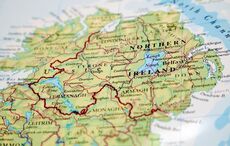Ireland’s Minister at European Commission says Brexit talks are moving forward, while operations remain to be discussed.
After an intensive weekend of talks it has been revealed that Britain has agreed there will be no “hard border” in Northern Ireland however no operational approach to the border has been resolved This agreement was reached under the conditions from the European Union, which will allow Northern Ireland to retain most of their EU benefits for nearly two years after Brexit goes into effect.
Ireland’s Minister for Foreign Affairs and Deputy Prime Minister Simon Coveney was in Brussels on Monday to meet with the Director of the European Commission Michel Barnier along with other Ministers from around the EU. Early on Monday morning he tweeted:
Good meeting with @MichelBarnier again this morning - #Brexit negotiations are moving forward - progress on Irish issues remains a key priority for both negotiating teams and solidarity with our EU partners remains strong. pic.twitter.com/JgN9xZe828
— Simon Coveney (@simoncoveney) March 19, 2018
The two sides issued a new, 129-page draft treaty. However, Barnier was quick to point out that this would not be legally binding until a whole treaty is ratified before Brexit a year from now. That being said this is a good step in the right direction when many feared that Britain might crash out of the negotiations without a deal from Europe.
Read more: The slow moving Brexit train wreck may reunite Ireland
He said "A decisive step remains a step; we are not at the end of the road and there still remains a lot of work to be done, including on Ireland and Northern Ireland.”
The decision over Norther Irish border has been referred to as a “backstop” solution. The European Union’s draft agreement said “The negotiators have reached agreement on some elements of the draft protocol.
“They further agree that the full set of issues related to avoiding a hard border covered in the draft reflect those that need to be addressed in any solution.
“There is as yet no agreement on the right operational approach, but the negotiators agree to engage urgently in the process of examination of all relevant matters announced on 14 March and now under way.”
The draft agreement states “With respect to the draft protocol on Ireland/Northern Ireland, the negotiators agree that a legally operative version of the ‘backstop’ solution for the border between Northern Ireland and Ireland…should be agreed as part of the legal text of the Withdrawal Agreement, to apply unless and until another solution is found.”
The EU and UK agreed to maintain the necessary conditions for continued North Ireland and Republic of Ireland cooperation. This would include the areas of environment, health, agriculture, transport, education and tourism, as well as energy, telecommunications, broadcasting, inland fisheries, justice and security, higher education, and sport.
Discussions on how to enforce a frictionless border will likely be the focus of the talks next week.
Northern Ireland’s Democratic Unionist Party, who are in coalition with Theresa May’s Conservative government, are in opposition to a deal which would see Northern Ireland differentiated in anyway from the United Kingdom.
According to the Belfast Telegraph, the details not yet agreed between the European United and United Kingdom, surrounding the Northern Irish border, include:
- Measures creating an area without internal borders in which the free movement of goods is ensured
- North-South cooperation between Northern Ireland and the Republic of Ireland is protected
– Prohibiting customs duties on imports and exports between the EU and UK specific to Northern Ireland, including duties of a fiscal nature.
– The banning of restrictions on imports and exports between the EU and Northern Ireland.
– Internal taxation rules.
– The application of EU law surrounding VAT and excise duties, agriculture, fisheries products and environmental protection to Northern Ireland.
Read more: Trump tells Irish he’ll top JFK and send astronauts to Mars
H/T: Reuters / Merrion St.




Comments